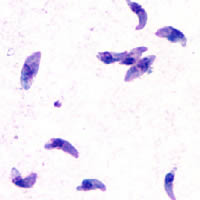
Photo from wikipedia
Background Emerging evidence implicates altered DNA methylation in mental illness including autism, ADHD, bipolar disorder, major depressive disorder, anorexia and schizophrenia. However, it is unclear whether the DNA methylation changes… Click to show full abstract
Background Emerging evidence implicates altered DNA methylation in mental illness including autism, ADHD, bipolar disorder, major depressive disorder, anorexia and schizophrenia. However, it is unclear whether the DNA methylation changes observed to date are causative or reflect disease progression or treatment. The neonatal period is a time of rapid neurodevelopment during which alterations in DNA methylation may contribute to the risk of mental illness later in life. Hence, we explored whether differences in DNA methylation in neonatal blood were associated with twin discordance for mental illnesses including autism, ADHD, affective disorder, anorexia, schizophrenia or bipolar disorder. Methods A total of 597 pairs of twins (220 monozygotic) discordant for mental illness born between 1981 and 2005 were identified for methylomic comparison. Blood samples obtained from neonatal Guthrie cards were used for DNA extraction and genome-wide profiling of DNA methylation with the use of Infinium HumanMethylation450 BeadChip or EPIC array from Illumina. Quality control, data pre-processing and statistical analysis was performed using the minfi package in R. Data were normalized using the ssNoob method and adjusted for batch effects using the Combat tool. Blood cell composition was estimated using FlowSorted.CordBlood.450k. Using linear regression models and including potential confounders such as sex, blood cell composition and zygosity, we observed differentially methylated positions (DMPs) associated with mental illness. We used VarElect (http://varelect.genecards.org/) to identify which genes are known to directly associate with mental illness. The GeneMania tool (http://genemania.org/) was used to visualize gene interactions in a network. Results We observed significant DMPs (P Discussion Our data indicate that DNA methylation differences are quantifiable in neonatal blood from twins discordant for mental illness later in life and suggest that susceptibility to mental illness is conferred by dysregulated neurodevelopmental genes.
Journal Title: European Neuropsychopharmacology
Year Published: 2019
Link to full text (if available)
Share on Social Media: Sign Up to like & get
recommendations!